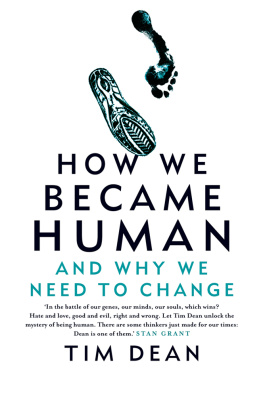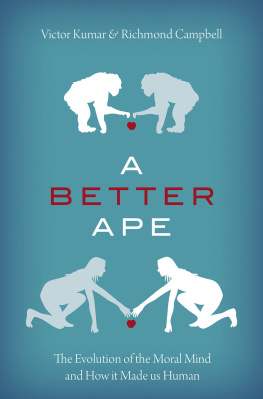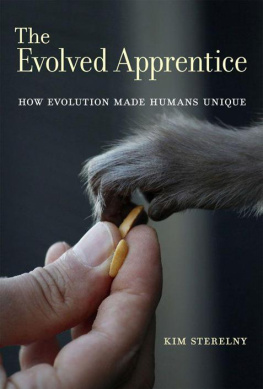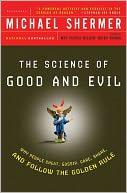A Natural History of Human Morality

Michael Tomasello

Cambridge, Massachusetts
London, England
2016
Copyright 2016 by the President and Fellows of Harvard College
All rights reserved
Cover design: Tim Jones
978-0-674-08864-1 (hardcover : alk. paper)
978-0-674-91587-9 (EPUB)
978-0-674-91586-2 (MOBI)
The Library of Congress has cataloged the printed edition as follows:
Tomasello, Michael.
A natural history of human morality / Michael Tomasello.
pages cm
Includes bibliographical references and index.
1. EthicsHistory. 2. Ethics, Evolutionary. 3. Philosophical anthropology. I. Title.
BJ1298.T66 2015
170.9dc23
2015010960
For Chiara, Leo, Anya, and Rita
Contents
A Natural History of Human Morality is a companion volume to my 2014 book A Natural History of Human Thinking. The parallel titles are appropriate because in both volumes I propose the same two-step sequence in the evolution of human social life: first, new forms of collaborative activity, and then new forms of cultural organization. In the first volume I attempted to spell out the species-unique kinds of thinking that emerged from these new forms of social life. In the current volume I attempt to explicate how these new forms of social life structured the way that early humans came to engage in moral acts that either subordinated or treated as equal their own interests and the interests of others, even feeling a sense of obligation to do so. This moral attitude or stance did notand still does notwin out consistently in individuals actual decision making, of course, but it does make those decisions, whatever their outcome, moral decisions.
I have been gathering my thoughts for this volume over the past five years or so, beginning with a seminar on the evolution of human cooperation held in the fall of 2009 here at the Max Planck Institute for Evolutionary Anthropology, and continuing with a similar seminar on the evolution of human morality held in the winter of 20122013. Many interesting and fruitful discussions in those seminars have shaped my thinking on these issues significantly, and I thank all of those who participated. I also had a number of very useful discussions during this same time period with Sebastian Rdl, who helped me with some difficult philosophical concepts.
In addition, a number of people read and provided very useful commentary on earlier versions of the manuscript. In particular, one or another draft version was read by Ivan Cabrera, Robert Hepach, Patricia Kanngiesser, Christian Kietzmann, Berislav Marusic, Cathal OMadagain, and Marco Schmidt. I thank them all for their extremely helpful comments and suggestions. I would like to single out for special thanks Neil Roughley and Jan Engelmann, who engaged with me and the manuscript especially deeply and on multiple occasions. For certain, the manuscript is much more coherent for all of their insights. I also thank Andrew Kinney, Richard Joyce, and an anonymous reviewer from Harvard University Press for their comments on the manuscript as well.
Finally, as with the first volume, my deepest gratitude goes to Rita Svetlova, with whom I have discussed extensively all of the most important ideas in this volumeand others that she helped me to let go ofto the great benefit of the final product. I dedicate this book to her and our children.
The commitments that bind us to the social body are obligatory only because they are mutual; and their nature is such that in fulfilling them one cannot work for others without at the same time working for oneself.
JEAN JACQUES ROUSSEAU, THE SOCIAL CONTRACT
Cooperation appears in nature in two basic forms: altruistic helping, in which one individual sacrifices for the benefit of another, and mutualistic collaboration, in which all interacting parties benefit in some way. The uniquely human version of cooperation known as morality appears in nature in two analogous forms. On the one hand, one individual may sacrifice to help another based on such self-immolating motives as compassion, concern, and benevolence. On the other hand, interacting individuals may seek a way for all to benefit in a more balanced manner based on such impartial motives as fairness, equity, and justice. Many classical accounts in moral philosophy capture this difference by contrasting a motive for beneficence (the good) with a motive for justice (the right), and many modern accounts capture the difference by contrasting a morality of sympathy with a morality of fairness.
The morality of sympathy is most basic, as concern for the well-being of others is the sine qua non of all things moral. The evolutionary source of sympathetic concern is almost certainly parental care of offspring based in kin selection. In mammals this means everything from providing sustenance to ones offspring through nursingregulated by the mammalian love hormone oxytocinto protecting ones offspring from predators and other dangers. In this sense basically all mammals show sympathetic concern, at the very least for offspring, but in some species for selected nonkin as well. In general, the expression of sympathy is relatively straightforward. There may be some cognitive complexity in determining what is good for ones offspring or others, but once that is determined, helping is helping, with the only serious conflict being whether the sympathy that motivates the helping act is strong enough to overcome any self-serving motives involved. Acts of helping motivated by sympathetic concern are altruistic acts freely performed and are not accompanied, in their purest form, by a sense of obligation.
In contrast, the morality of fairness is neither so basic nor so straightforwardand it may very well be confined to the human species. The fundamental problem is that in situations requiring fairness there is typically a complex interaction of the cooperative and competitive motives of multiple individuals. Attempting to be fair means trying to achieve some kind of balance among all of these, and there are typically many possible ways of doing this based on many different criteria. Humans thus enter into such complex situations prepared to invoke moral judgments about the deservingness of the individuals involved, including the self, but they are at the same time armed with more punitive moral attitudes such as resentment or indignation against unfair others. In addition, they have still other moral attitudes that are not exactly punitive but nevertheless stern, in which they seek to hold interactive partners accountable for their actions by invoking interpersonal judgments of responsibility, obligation, commitment, trust, respect, duty, blame, and guilt. The morality of fairness is thus much more complicated than the morality of sympathy. Moreover, and perhaps not unrelated, its judgments typically carry with them some sense of responsibility or obligation: it is not just that I want to be fair to all concerned, but that one ought to be fair to all concerned. In general, we may say that whereas sympathy is pure cooperation, fairness is a kind of cooperativization of competition in which individuals seek balanced solutions to the many and conflicting demands of multiple participants various motives.
Our goal in this book is to provide an evolutionary account of the emergence of human morality, in terms of both sympathy and fairness. We proceed from the assumption that human morality is a form of cooperation, specifically, the form that has emerged as humans have adapted to new and species-unique forms of social interaction and organization. Because
Next page









